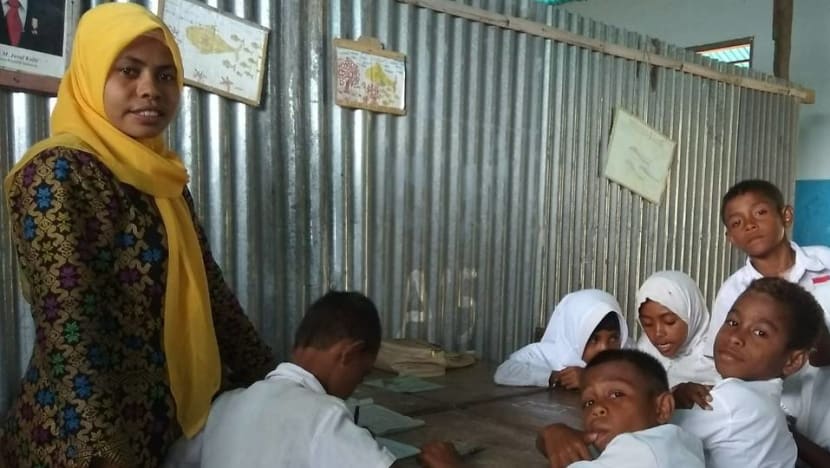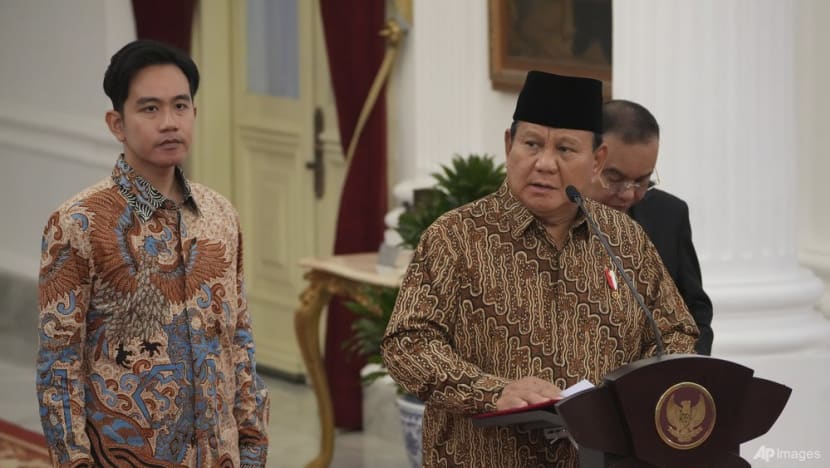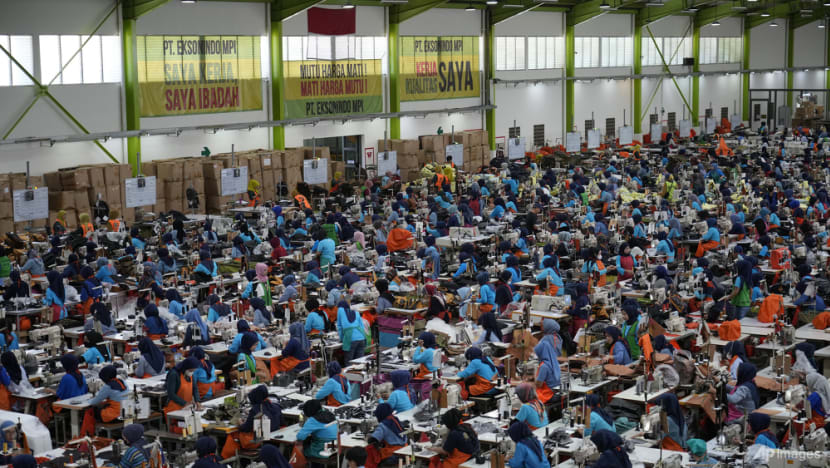analysis Asia
Prabowo’s planned salary hikes for teachers, judges and other workers a double-edged sword for Indonesia
Salary increases are needed in Indonesia, but productivity needs to keep pace and the government needs solutions to maintain the state budget, experts say.


This audio is generated by an AI tool.
JAKARTA: Rahima, 32, has been a teacher for nine years in Alor, an island in Indonesia’s East Nusa Tenggara province.
She has a bachelor’s degree in education but earns only about 300,000 rupiah (US$18.50) per month from working five days a week as an honorary teacher at a public elementary school.
Honorary teachers get an honorarium based on the amount of hours they work and are largely given the same responsibilities as full-time teachers.
Rahima's pay is a fraction of the minimum provincial wage of about 2.3 million rupiah, and she supplements her income by selling candlenuts and coffee on her days off.
With President Prabowo Subianto’s wage hike for teachers taking effect from this month, Rahima could see a pay bump to 2 million rupiah a month.
Prabowo announced a 100 per cent basic salary increase for state teachers and an allowance of 2 million rupiah for part-time teachers in state schools on Nov 28 during a National Teachers’ Day event.
The salary adjustment, he said, would require an additional 16.7 trillion rupiah, bringing the total teachers’ welfare budget to 81.6 trillion rupiah (US$5.1 billion) in 2025, news outlet Jakarta Globe reported.
Teachers are not the only group of workers Prabowo wants bigger paychecks for.
A day after the Teachers’ Day event, Prabowo issued a statement announcing the average national minimum wage would be increased by 6.5 per cent in 2025. Previously, regions set their own minimum average salary.
Prabowo cited the “particular importance” of workers’ welfare and said minimum wage is “a very important social safety net for workers who have worked for less than 12 months, taking into account the need for a decent living”.
The higher minimum wage aims to “increase workers’ purchasing power, while still paying attention to our business competitiveness”, he added.

Before he became president on Oct 20, Prabowo also vowed amid a nationwide strike by judges that the state would provide them with “sufficient income”.
Indonesia reportedly has 7,700 judges at the district, provincial and national levels and the base salary of a first-year judge is 2 million rupiah a month, with allowances making up a total of 16.6 million rupiah a month.
In the lead-up to his victory at Indonesia’s presidential election on Feb 14 last year, Prabowo had also vowed to increase the salaries of civil servants, army officers and national police officers.
News outlet Tempo reported in September 2024 that the Prabowo government has prepared a budget of 297.71 trillion rupiah for civil servant salaries and allowances in 2025, an increase of 21.37 trillion rupiah or 7.7 per cent from the previous year's budget of 276.34 trillion rupiah. But the government has not announced details for civil servants, army and police officers yet.
The increase in minimum wage and pay hike for teachers will be welcomed by workers, say analysts, and could be seen as quick moves by Prabowo to deliver on campaign promises early in his presidency.
“This decision will earn him support from labour groups, thus strengthening his political legitimacy,” said Siwage Dharma Negara, a senior fellow and co-coordinator of the Indonesia Studies Programme at Singapore’s ISEAS-Yusof Ishak Institute.
Higher wages are expected to boost household incomes, increase spending, and stimulate the domestic economy, a key driver of growth in Southeast Asia’s biggest economy, Siwage added.
But “the feasibility of raising the minimum wage depends on economic conditions and policy implementation”, he said.
SOME BUSINESSES SAY THEY CAN’T RAISE WAGES
Some business owners told CNA raising wages may not be feasible.
Hermawati Setyorinny, chairwoman of the Indonesian association of micro, small, and medium enterprise industry (AKUMANDIRI), said only a small number of roughly 50,000 association members are able to increase their workers’ wages by 6.5 per cent.
“In Indonesia, the … micro businesses are struggling to grow,” she said.
Esti Wahyuningtyas, a Jakarta-based entrepreneur with five employees, said she is unable to increase their wages.

Since starting her business five years ago selling Gudeg, a traditional Javanese dish from Yogyakarta made from unripe jackfruit, she has struggled to expand her business beyond one outlet.
She said she will not increase her employees’ salaries and will inform them of her financial situation.
“I will talk to them and ask them if they want to continue working for me,” she said. “Because actually, if they cannot accept it, there are still many people who are looking for a job.”
Indonesia’s manpower ministry reported a rise in job losses from January to June last year due to challenging global economic conditions. The 32,064 workers laid off between January and June 2024 was a 21.4 per cent increase from the 26,400 laid off in the same period in 2023.
And although the country lowered its unemployment rate from 5.45 per cent in February 2023 to 4.82 per cent in February 2024, the country’s youth unemployment rate is much higher at 17.02 per cent for those aged 20 to 24 in 2022, according to a report last year by the Central Statistics Agency.
Certain industries are also struggling.
“Some labour-intensive industries, such as textiles and garments, might struggle to absorb the additional costs given the current weak demand, potentially leading to layoffs or business closures,” said Siwage of ISEAS-Yusof Ishak Institute.

Indonesian textile giant Sri Rejeki Isman, or Sritex, was reported in October to be contesting a court decision declaring it bankrupt. It employs about 50,000 workers, Bloomberg reported.
Sritex’s rival Pan Brothers is also seeking to restructure its debt of about US$325 million, according to Bloomberg.
The government should help businesses if it expects them to meet its minimum wage requirements, said Bob Azam, who heads the manpower unit at the Indonesian Employers Association (Apindo).
“They should help us develop so businesses can survive,” he said.
GOVT NEEDS TO “WORK HARD” AT BOOSTING REVENUE
Wijayanto Samirin, an economist and public policy expert from Jakarta’s Paramadina University, believes this year's state budget will also be affected by the planned salary increases announced after the state budget was tabled in September last year.
“At the moment, revenue is difficult to boost due to falling commodity prices, an economic slowdown and declining purchasing power,” he said.
Currently, many new national programmes are also relying on the state budget, he said.
He added that the government also needs to pay debt interest of more than 550 trillion rupiah.
For the past 25 years, the Indonesian government has run a budget deficit to accelerate economic growth.
This year’s free meal programme for children and pregnant women is one of the government’s core initiatives, but experts believe it will lead to additional state debt.

For this programme, the government has allocated a budget of 71 trillion rupiah in 2025. The amount allocated per meal has decreased from 20,000 rupiah during a trial in mid-2024, to 10,000 rupiah announced in November.
While salary increases are needed, productivity needs to keep pace and the government needs to develop solutions to maintain the state budget, experts said.
“Investors may view increased labour costs as a deterrent, particularly if the wage hike is not accompanied by productivity improvements,” said Siwage.
“Also, it is important to note that Indonesia’s provinces vary significantly in terms of economic development. A uniform wage increase, for example, (of) 6.5 per cent, might disproportionately affect regions with weaker economies, where businesses are less capable of absorbing the wage hike,” he added.
To increase revenue, the government had wanted to increase value-added tax (VAT) from 11 per cent to 12 per cent from Jan 1 but faced massive public pushback, resulting in a last-minute U-turn.
Hours before it was set to take effect, the VAT increase was scaled back to apply to only luxury goods and items.
Economists have said Indonesia needs to consider alternative tax sources that offer a stronger revenue base.
“The government needs to work hard, creatively, and innovatively in 2025 and 2026,” concluded Wijayanto.




















